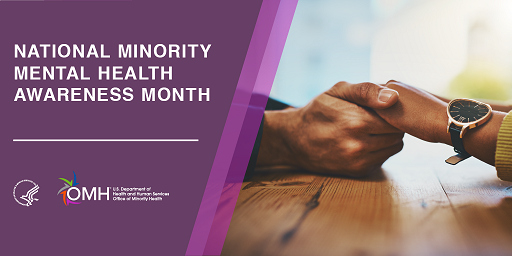
National Minority Mental Health Awareness Month is observed each July to bring awareness to the unique struggles that racial and ethnic minority communities face regarding mental illness in the United States. The COVID-19 pandemic has made it harder for racial and ethnic minority groups to get access to mental health and substance-use treatment services.
Bebe Campbell Moore was an author, journalist, teacher, and mental health advocate. Her advocacy grew out of supporting her children in their mental health struggles and seeing her community do the same. She became a national spokesperson for the National Alliance on Mental Illness (NAMI) and worked to break the stigma around mental illness in Black communities. She advocated for a bill in congress for national minority mental health awareness month — a bill that was amended and passed after her death to recognize July as Bebe Moore Campbell National Minority Mental Health Awareness Month.
"Once my loved ones accepted the diagnosis, healing began for the entire family, but it took too long. It took years. Can't we, as a nation, begin to speed up that process? We need a national campaign to destigmatize mental illness, especially one targeted toward African Americans...It's not shameful to have a mental illness. Get treatment. Recovery is possible."
–Bebe Moore Campbell, 2005
Minority Mental Health Awareness Month attempts to shed light on the multitude of mental health experiences within BIPOC (Black, Indigenous, People of Color) communities and others that face disproportionate inequities due to systemic barriers. Marginalized and oppressed people have unique concerns, trauma, stress, obstacles, and challenges because of historical experiences, cultural differences, and social disparities. They also face additional barriers to finding support and services because of additional stigma and systemic injustices.
CAPS Connect is a consultation-based service for MSU students, aimed at reaching historically underrepresented groups, in which specific CAPS staff are assigned to unique student populations/areas of campus. CAPS Connect provides a place to talk about concerns. You can have someone listen to you and offer support, or you may prefer to receive expert suggestions about solutions and resources. Through brief 10-15 minute consultations, CAPS staff are able to listen, help students problem-solve specific issues, and develop a relationship that may transition into additional care when needed. For more information about CAPS Connect, visit https://caps.msu.edu/services/CAPSConnect.html
If you are concerned about a fellow student or are seeking personal support you can send an email to the team at .
Your contact is kept strictly confidential. Please include a brief description of what the concern is about for the person or yourself. Emails will be responded to within 24 hours during regular weekday business hours from 8:00 a.m. to 5:00 p.m. If you are concerned about an immediate safety risk to self or others, dial 911. For further information go to the Care Team page.
The Wellness & Counseling Office provides confidential professional consultation and counseling regarding any issue of concern for MSUCOM students. The office also assists students in connecting with referrals near their site. Sessions can be scheduled in-person or arranged on-line by Zoom. Note: if you or someone you are concerned about is threatening suicide or harm to oneself or another dial 911 immediately.
Counselor contact information:
Dr. John R. Taylor (EL): (517) 432-0141,